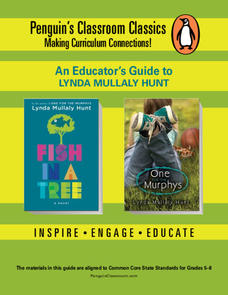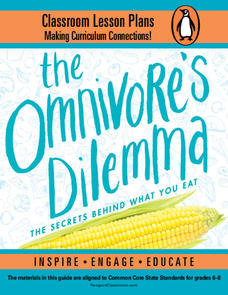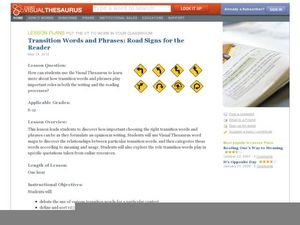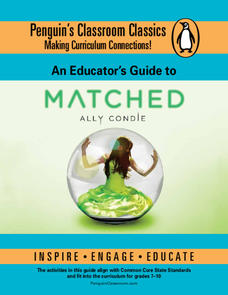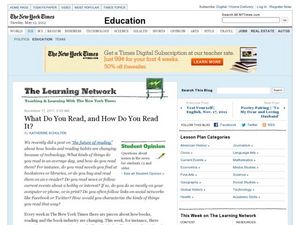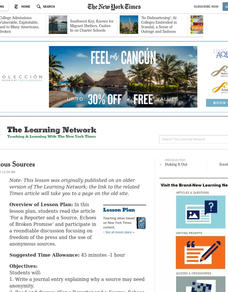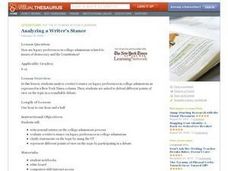Penguin Books
An Educator's Guide to the Works of Lynda Mullaly Hunt
Middle school years can be tough. An educator's guide for the works of Lynda Mullaly Hunt introduces readers to two texts that discuss the struggles pre-teens face during middle school. Chapter-by-chapter questions and activities for two...
Penguin Books
The Omnivore’s Dilemma, Young Readers Edition
As the saying goes, you are what you eat. A useful set of lesson plans encourage young readers to take a second look at their eating habits. Pre- and post-reading questions bring in reflective writing and discussion while extension...
Curated OER
Transition Words and Phrases: Road Signs for the Reader
Therefore! However! Furthermore! Explore the power of transition words and phrases. Signal your readers by suggesting the relationship between different thoughts or points. Help them demonstrate an understanding of word relationships.
Penguin Books
An Educator's Guide to Matched by Ally Condie
Even supposed Utopian societies have their flaws. Using an educator's guide, individuals explore the society Ally Condie creates in Matched. Reflective writing prompts double as discussion questions and cover key themes in the novel, as...
Curated OER
"All Together Now" by Barbara Jordan
Cover the topic of race relations with these questions that go with Barbara Jordan's persuasive speech "All Together Now." These reading questions ask readers to think about her speech in a variety of ways by analyzing particular words...
Curated OER
Increase Kindness, Defeat Bullying: Lady Gaga's Born This Way Foundation
High-interest content captures your most reluctant readers and class participants. Lady Gaga's Born This Way Foundation, in collaboration with Harvard University, seeks to nurture a culture of kindness and reduce bullying. Excerpts from...
Curated OER
Student Opinion: What Do You Read, and How Do You Read It?
Stimulate discussion with this brief article and series of questions related to reading habits. This resource, from the New York Times' The Learning Network, asks learners to comment on their own reading habits. You could have your class...
Curated OER
Lesson Learned: Creating a Life Reports Project
Tap into the wisdom and knowledge of older members of the community with this New York Times plan. To warm up, learners write about and discuss advice they have been given. After reading "The Life Report," an op-ed column that asks older...
Penguin Books
The Curriculum Guide for The Secret Hum of a Daisy by Tracy Holczer
The death of a parent can turn a child's world upside down. A curriculum guide for The Secret Hum of a Daisy explores defining moments in the main character's life, including the loss of her mother. Chapter-by-chapter discussion...
The New York Times
News and News Analysis: Navigating Fact and Opinion in the Times
Help your class understand the difference between fact and opinion by exploring the New York Times homepage and articles. In pairs or small groups, pupils complete a scavenger hunt, answering the provided questions. Next, discuss the...
Odell Education
Reading Closely For Textual Details: Grade 8
Only a thorough understanding of history can save us from repeating it. Practice close reading skills with an eighth grade unit that focuses on 19th century America, including European immigration into Ellis Island and Frederick...
Curated OER
Sense, Sensibility and Sentences: Examining and Writing Memorable Lines
Involve your readers in finding works of literary genius. Have each individual write down compelling sentences that they read or hear, whether in a newspaper, advertisement, book, movie, song, or any other place! Once each person has a...
Curated OER
The Reader's Recourse
Students discover the recourse newspapers face for reporting wrong information. After reading an article, they examine the dispute between a pharmaceutical company and the New York Times. They evaluate the roles of the editor and the...
Teacher’s Pet Publications
A Common Core Approach to Teaching Of Mice and Men
Whether or not your school/state has adopted the Common Core standards, you will want to add this resource to your Of Mice and Men curriculum materials. The chapter-by-chapter activities ask readers to provide evidence from the novella...
Curated OER
Anonymous Sources in the Media
When do people ask for anonymity? Why? After reading the New York Times article "For a Reporter and a Source, Echoes of Broken Promise," young readers participate in a roundtable discussion focusing on freedom of the press and the use of...
Curated OER
Basil Heatter, "The Long Night of the Little Boats"
“It was a miracle.” Basil Heatter’s “The Long Night of the Little Boats,” which details the miraculous rescue of the British army from the shores of Dunkirk in 1940, is featured in a series of exercises that ask class members to read,...
Curated OER
Literary Analysis: Summary vs. Analysis
What is the difference between summary writing and literary analysis? A 16-slide presentation offers some basic requirements for both types of writing and helps readers identify each based on keywords used in both types of writing....
Curated OER
How Do Adjectives Improve Writing?
Using adjectives to create vivid descriptions is the focus of exercises in this resource. A cloze reading activity asks class members to add missing adjectives to passages from Mark Teague's The Lost and Found. They then read Teague's...
Curated OER
Student Opinion: What Small Things Have You Seen and Taken Note of Today?
An interesting and unusual topic for a news article, this resource from the New York Times website asks learners to take a moment and consider all the things they notice during a typical day. Based of the editorial piece "Things I Saw"...
Curated OER
Introduction to The Diary of Anne Frank
Get a glimpse of Anne Frank's years in hiding with this activity, which introduces The Diary of Anne Frank. Readers complete a journal entry about how they would keep themselves occupied if they were forced into hiding (without personal...
Smithsonian Institution
Art to Zoo: Life in the Promised Land: African-American Migrants in Northern Cities, 1916-1940
This is a fantastic resource designed for learners to envision what it was like for the three million African-Americans who migrated to urban industrial centers of the northern United States between 1910 and 1940. After reading a...
Curated OER
Analyzing a Writer's Stance
Should college admissions decisions be based on whether whose family members attended? Secondary students read and respond to a New York Times article on the issue of 'legacy preferences' in college admissions. Following class...
Curated OER
Political Cartoons: Literacy
Readers decode and deconstruct political cartoons to heighten critical thinking, extra-textual literacy, and making meaning from symbolism and metaphor. A compatible activity to use in English class when your 8th or 11th graders are...
Curated OER
Leads for Descriptive Writing
Students write two descriptive leads to learn how to reel in readers. After their leads have been written, they will share with a partner to decide which was the most appealing. In this leads instructional activity, students can also...


